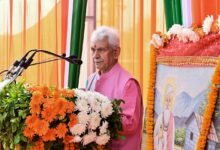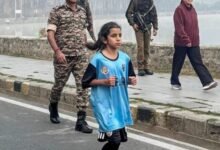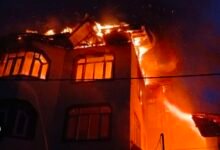
Srinagar, Sept 29: With the stage set for the third and final phase of the Jammu and Kashmir Assembly elections, more than 39.18 lakh voters are eligible to cast their ballots across 40 Assembly Constituencies (ACs) on October 1, 2024.
The Chief Electoral Officer (CEO), Pandurang K Pole, said that comprehensive arrangements have been made to ensure a smooth and peaceful voting process across the seven districts involved in this crucial phase.
In this final phase, Jammu district has the highest number of candidates at 109, followed by Baramulla (101), Kupwara (59), Bandipora (42), Udhampur (37), Kathua (35), and Samba (32).
Meanwhile, the districts going to polls include Kupwara, Baramulla, Bandipora in the Kashmir Division, and Udhampur, Samba, Kathua, and Jammu in the Jammu Division. The constituencies in Kashmir Division going to the polls include: Karnah, Tregham, Kupwara, Lolab, Handwara, Langate, Sopore, Rafiabad, Uri, Baramulla, Gulmarg, Wagoora-Kreeri, Pattan, Sonawari, Bandipora, and Gurez (ST).
Meanwhile, in the Jammu Division, constituencies include Udhampur West, Udhampur East, Chenni, Ramnagar (SC), Bani, Billawar, Basohli, Jasrota, Kathua (SC), Hiranagar, Ramgarh (SC), Samba, Vijaypur, Bishnah (SC), Suchetgarh (SC), R.S Pura, Jammu South, Bahu, Jammu East, Nagrota, Jammu West, Jammu North, Akhnoor (SC), and Chhamb.
In total, 5,060 polling stations will be established, supported by over 20,000 staff members, including presiding officers and polling officers. Additionally, 240 special polling stations will cater to specific groups such as women, persons with disabilities (PwDs), and young voters.
“We have ensured all the logistical preparations are in place, and voters will experience an efficient and secure process at every polling station,” said Pandurang K Pole.
A total of 39,18,220 voters are registered for this phase, including 20,09,033 male voters, 19,09,130 female voters, and 57 from the third gender. The youth segment (aged 18-19 years) will see participation from 1.94 lakh voters, while 35,860 PwDs and 32,953 elderly voters above 85 years are also eligible to vote.
“We are expecting a higher voter turnout this time around, especially among younger voters and first-time voters who are eager to contribute to shaping the future of J&K,” said a senior election official involved in youth engagement efforts.
Polling will take place from 7:00 am to 6:00 pm, with mock polls conducted in the presence of polling agents prior to the official start. Even after 6:00 PM, those already in queue will be allowed to vote, ensuring that no one is denied their right.
All polling stations will be equipped with Assured Minimum Facilities (AMF), including drinking water, electricity, ramps, and wheelchair availability. A notable feature will be Braille-enabled ballot units to support visually impaired voters. Separate queues will be established for senior citizens and PwDs to facilitate early voting.
“We are committed to making voting accessible to all. Special provisions for PwDs and elderly voters have been prioritized in this phase,” said the CEO.
A variety of unique polling stations have been established, including 50 women-managed “Pink Polling Stations,” 43 stations manned by PwDs, 40 managed by young election officials, and 45 “Green Polling Stations” to promote environmental awareness. There are also 29 polling stations near the Line of Control (LoC) and International Border (IB) for voters residing in these sensitive areas.
“These special polling stations represent our efforts to engage various sections of society and encourage maximum voter participation,” a spokesperson for the Election Commission stated.
Voter information slips have been distributed to all registered voters, providing them with key details like polling station name, serial number, and QR code. However, these slips will not serve as identification at polling stations. Instead, voters must present any one of 12 approved ID documents, such as Aadhaar, PAN card, driving license, or passport.
For voters who recently enrolled or updated their information, EPIC (Electoral Photo ID Card) cards have been dispatched via speed post. However, those who have yet to receive their EPIC card can vote with any of the approved alternate IDs.
The Election Commission’s SVEEP (Systematic Voters’ Education and Electoral Participation) campaign has been instrumental in raising awareness and encouraging voter turnout. Through street plays, social media influencers, and indigenous sports activities, the SVEEP initiative has made significant strides in reaching all sections of society.
Over 1,600 journalists and cameramen from various media outlets have been issued passes to cover the election process. The Voter Turnout App will also provide real-time updates on voter participation, with polling percentages reported every two hours.
All 5,060 polling stations will be equipped with CCTV cameras for live webcasting, ensuring transparency and security. In areas with limited communication infrastructure, satellite phones and wireless sets have been provided, while vehicles used for election purposes will be tracked via GPS. In compliance with the Model Code of Conduct, materials worth ₹128 crore, including cash, liquor, and drugs, have been seized across the Union Territory since the announcement of elections.
Public campaigning concluded on September 29, 48 hours before polling begins. During this silence period, no campaign-related activity will be permitted. Political advertisements in print media will require prior clearance from the Media Certification and Monitoring Committee (MCMC), and the sale of liquor has been banned during this period.
Special polling stations have been set up for migrant voters from the Kashmir Division, with 24 stations in total, including 19 in Jammu, 4 in Delhi, and 1 in Udhampur. These stations will offer the same facilities as regular polling stations, ensuring that migrant voters can exercise their franchise without any issues.
“Jammu and Kashmir’s assembly elections mark a pivotal moment for the region’s democratic future. We are committed to providing a seamless, accessible, and transparent election process for every voter,” Pole said.
“Voting is a sacred right, and it’s heartening to see the administration making every effort to ensure that people of all abilities can participate,” said 88-year-old voter Abdul Rashid from Baramulla.
“We are ready and excited to cast our votes. It’s an opportunity for change,” said Rafiq, a first-time voter from Kupwara.
Meanwhile, voter turnout has been strong in earlier phases, with 61.38% participation in the first phase on September 18 and 57.31% in the second phase on September 26. This election marks the first Assembly election in Jammu and Kashmir since the abrogation of Article 370 in August 2019, with results expected to be announced on October 8.





